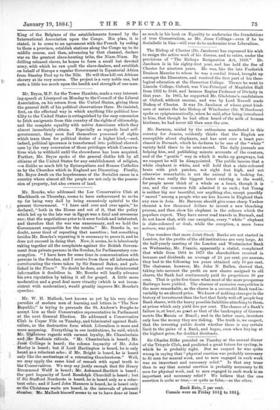One wonders that more Joint-Stock Banks are not started in
London, for the profits of the old institutions are very large. At the half-yearly meeting of the London and Westminster Bank on Wednesday, Mr. Francis, apparently a statist, complained that while from 1864 to 1873 the shareholders received in bonuses and dividends an average of 24 per cent. per annum, they had in the following ten years obtained only 16 per cent. The chairman, however, Mr. John N. Bullen, showed that, taking into account the profit on new shares assigned to old shares, the Bank had continuously paid its proprietors 30 per cent. That is quite five times what most of the more prosperous Railways have yielded. The absence of excessive competition is the more remarkable, as the shares in a successful Bank tend in- variably to an absurd price. We know of nothing stranger in the history of investment than the fact that fairly well-off people bay Bank shares, with the heavy possible liabilities attaching to them, at prices which only yield five per cent. The chance of a Bank's failure is, at least, as great as that of the bankruptcy of Govern- ments like Russia or Brazil ; and in the latter cases, investors only lose the money they are risking. The truth is, we suspect, that the investing public doubt whether there is any certain limit to the gains of a Bank, and hopes, even when buying at the highest price, for doubled dividends.


































 Previous page
Previous page